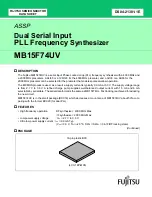
UTL3 – Dual VCA
Rev1 – Jan2010
Overview:
The UTL3 features two independent Voltage
Controlled Amplifiers (VCAs) each with
response switchable from Linear to
Exponential.
Controls:
1.
Audio Input1
– DC-coupled input for
the signal to be processed by VCA1
(t/-5v).
2.
Control CV1 –
Amplitude Modulation
input for VCA1 with depth control
(Mod1). Requires a 10v PtoP signal for
full range.
3.
Audio Input2
– DC-coupled input for
the signal to be processed by VCA2
(t/-5v).
4.
Control CV2
– Amplitude Modulation
input for VCA2 with depth control
(Mod2). Requires a 10v PtoP signal for
full range.
5.
VCA1 Response
– Switchable from
Linear to Exponential response.
6. VCA Output1
7.
VCA1 Initial Control –
Manual
Amplification control for VCA1 from
fully closed to fully open (unity gain).
8.
Amplitude Modulation Depth 1
– To
adjust the depth of modulation from
the CV1 input.
9.
VCA2 Initial Control
– Manual Amplification control for VCA2 from fully closed to fully
open (unity gain).
10.
Amplitude Modulation Depth 2
– To adjust the depth of modulation from the CV2
input.
11.
VCA2 Response
– Switchable from Linear to Exponential response.
12.
VCA Output2
Notes
•
The modulation inputs require a 10v Peak-to-Peak signal for full range (lower voltage
ranges must be amplified before use). Be aware of the type of modulation signal being
applied and how this will affect the Initial control setting – for b/-5v control
signals the Initial control should generally be set to about half-way for full deflection,
while for unipolar 0-10v control signals the Initial control should be set to zero (In both
cases the Mod control depth should be set to full).
Adjustments
•
Each VCA has an Offset Trimmer to null any DC offset (setup before shipping). There
are two possible ways to adjust the setting – I) apply a +/-5v square-wave modulation
signal to the CV input, turn the Initial control to midway and the Mod control to full.
Leave the Input socket disconnected. When correctly trimmed there should be minimal




















